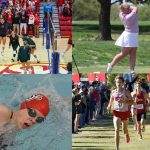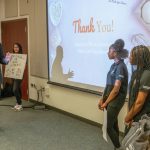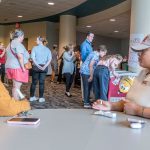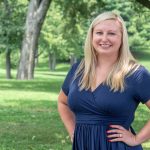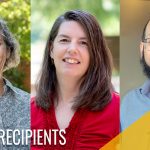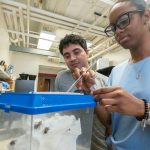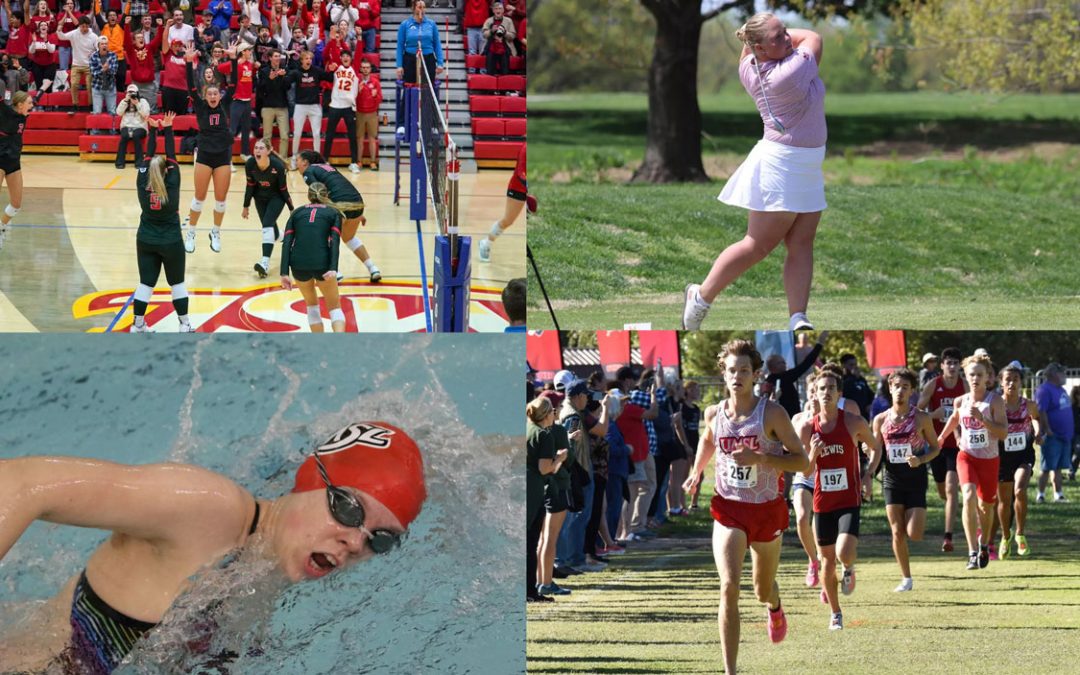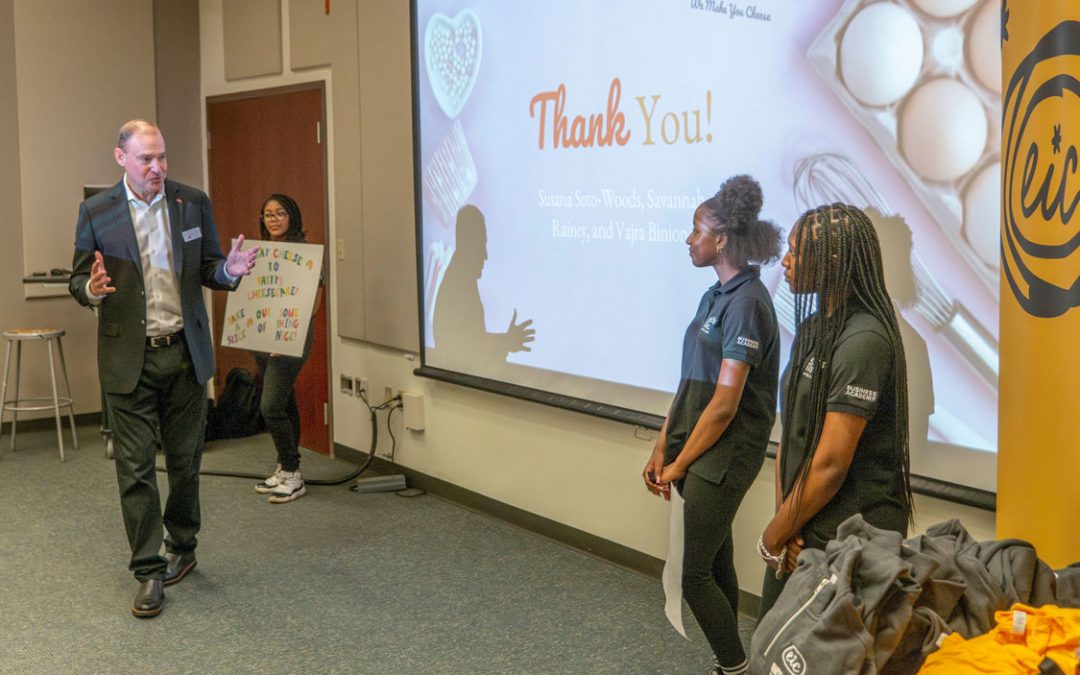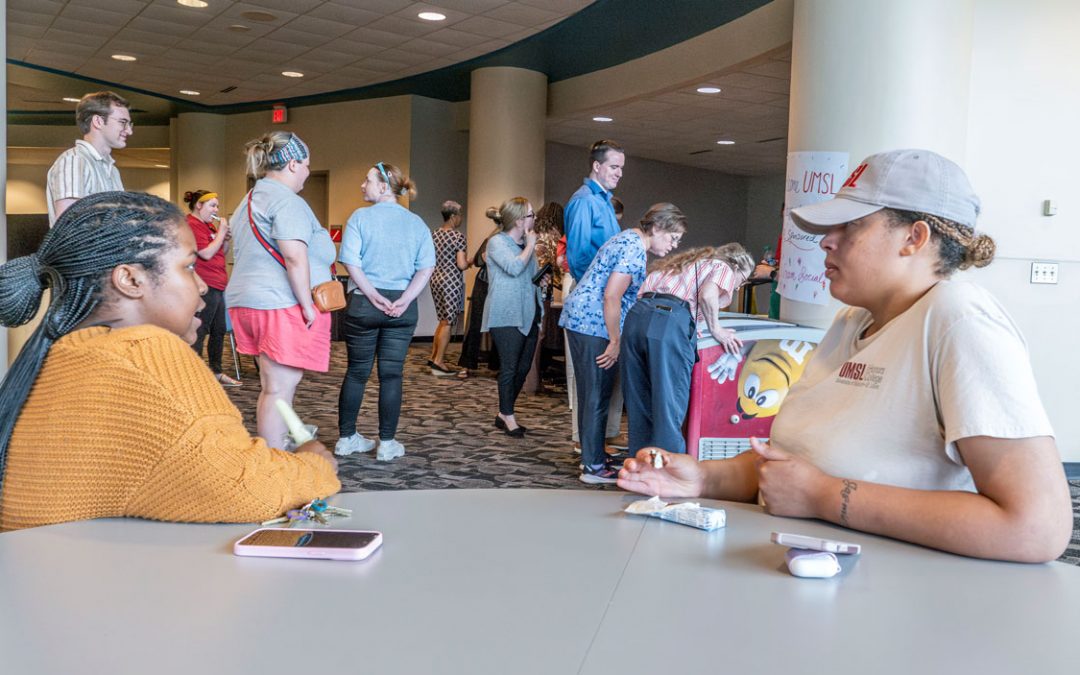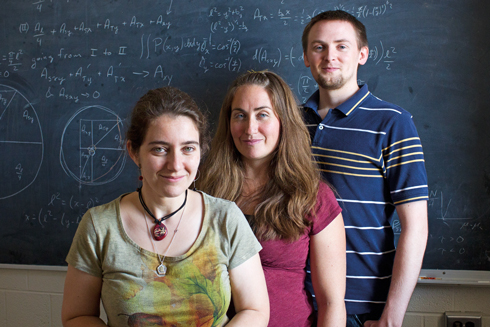
Sonya Bahar (left), associate professor of biophysics and director of the Center for Neurodynamics at UMSL, and graduate students Dawn King and Adam Scott are researching computational and mathematical models of evolution with help from a James S. McDonnell Foundation grant. (Photo by August Jennewein)
The University of Missouri–St. Louis set and attained many fundraising objectives over the course of its seven-year, $154 million Gateway for Greatness Campaign that ended this summer. No objectives were more important than enhancing teaching, learning and research at the university.
What follows are three examples of how the university advanced academics with support from individuals and organizations.
Funded research
Discoveries that arise from university research can foster economic development and lead to innovations that help people. Those are just two outcomes that underscore why research is a pillar of the university’s mission, according to Nasser Arshadi, vice provost for research at UMSL.
“We are currently working on four dozen new technologies in medical devices, diagnostics and drug discovery,” Arshadi says. “At its best, university research improves lives.”
But sustaining the university’s research initiatives can be challenging. An economy that’s been slow to recover from a recession, budget cuts from the state of Missouri and a decline in federal funding have increased the need for UMSL and other universities to obtain additional funding from nongovernment sources, including nonprofit foundations, corporations and individual donors.
Sonya Bahar, associate professor of biophysics and director of the Center for Neurodynamics at UMSL, garnered a three-year research award last year from the James S. McDonnell Foundation. The organization is based in Richmond Heights, Mo., and awards millions of dollars each year to support scientific, educational and charitable causes around the world.
The grant, “Complex dynamics, phase transitions, and scaling in an evolutionary model,” totaled more than $188,000 and is enabling Bahar and graduate students Dawn King and Adam Scott to work on computational and mathematical models of evolution. They’re studying how the amount of mutation in a system effects the formation of species and how organisms break up into different species.
“In this case, I think the McDonnell Foundation is willing to fund things that are a little bit more theoretical, a little more exploratory and with less immediate applications than a larger government funding agency,” Bahar says.
The funding not only makes the trio’s efforts possible, but the dollars enable King and Scott to work full steam ahead on their research, without many distractions, while pursuing doctoral degrees in physics at UMSL.
“They can focus on doing the work they need to finish their degrees,” Bahar says.
When King first came to UMSL she worked as a graduate teaching assistant. She says it was doable but difficult to balance all of her responsibilities, which included research, coursework and teaching. The grant has given her a little more flexibility and the chance to work more closely with Bahar, her faculty mentor.
“The grant provides an opportunity for me to participate in cutting-edge research so that I’m more marketable when I earn my PhD,” King says.
While the McDonnell Foundation is a private funding source, Bahar says support in all forms is essential to researchers.
“Without funding, it would be possible to do research,” she says. “But the process would go much, much more slowly.”
Renewed learning spaces
Thanks to a $750,000 gift from St. Louis-based Peabody Energy, UMSL will renovate two existing lab spaces – creating a modern technology-based physics laboratory and an environmental sciences laboratory that will enable students to better understand the impact humans have on the Mississippi River.
The physics lab will be located on the third floor of Benton Hall, and the environmental sciences lab will fill a spot on the third floor of Stadler Hall. The buildings are among the oldest on campus, constructed in 1964 and 1967, respectively. They’re central to the education of all UMSL students but are particularly important to the 1,500 students who study in the STEM disciplines, or science, technology, engineering and mathematics.
“Peabody invests in the education of the next generation, because we believe an educated society is key to building stronger, safer and healthier communities,” says Greg Boyce, chairman and chief executive officer of Peabody Energy. “Our investment in UMSL recognizes the university as one of our region’s most valuable assets in delivering quality STEM education at a reasonable cost. The renovations of these laboratories are important for our region, and they’re important for our future work force.”
Patricia Parker is the E. Desmond Lee Endowed Professor of Zoological Studies and chair of the Department of Biology at UMSL. She led the push to create the environmental sciences lab. In the spring semester, her department welcomed its first students to a new interdisciplinary minor program in environmental studies. The lab will enable the biology department to add a course to the program – one in applied environmental studies.
The renovated space will be equipped with many new tools for students, including microscopes, one or two DNA sequence analyzers and a half dozen or so PCR machines. (The polymerase chain reaction is a technology that allows scientists to identify a piece of DNA and make many copies of it so it can be studied in the future.)
The course will be an elective that will target non-biology majors. Parker says the Mississippi River will provide those students with excellent opportunities to learn how people can change chemical and physical aspects of vital waterways. For example, water samples and the organisms they contain can be analyzed microscopically and genetically to measure the concentrations of human waste or gauge the impact of other contaminants.
“A lot of it will be open-ended, exploratory stuff where we can compare what’s above St. Louis to what’s below St. Louis and make the deduction that the difference is attributable to what’s happening as the water passes through our human population,” Parker says.
The new physics lab will improve teaching and learning in two critical courses offered by the Department of Physics and Astronomy, according to Bernard Feldman, professor of physics and associate dean of the University of Missouri–St. Louis/Washington University in St. Louis Joint Undergraduate Engineering Program.
About 210 students a year take Basic Physics I, a course predominantly filled with undergraduate students who are pursuing non-physics degrees. Another 90 students a year take Physics: Mechanics and Heat, a required course for physics majors. Both courses funnel year-round through the same lab, one that’s remained largely unchanged for decades.
The new lab will be created in an unused room so that construction won’t disrupt current sections of the two courses using the existing lab. Audio-visual gear will be upgraded. Workstations will have interfaced computers so students can collect, analyze and display data. Round tables will replace the existing rows of long, narrow worktables, and the lab’s layout will bring the students and instructor closer together.
“The students can interact better,” Feldman says. “Rather than being situated in a line, they’re in a circle, so they can talk to each other, help each other out and work together better.”
Peabody’s major gift was the final one booked toward the Gateway for Greatness Campaign. Renovations are scheduled to begin in the spring semester. Both labs will carry the Peabody name.
Endowed professorships
The Gateway for Greatness Campaign has supported a number of faculty positions. Among them are a new endowed professorship, an endowed chair position and a directorship. An existing curatorship was also supported.
Anonymous gifts helped establish two positions in the College of Nursing – the director of the Collaborative Center for Nursing Outcomes, Research and Innovation and the Endowed Chair for Advanced Nursing Practice. An additional anonymous gift will sustain the St. Louis Mercantile Library Association Endowed Curator of Art, which is held by Julie Dunn-Morton.
Peter G. Schick, BSBA 1974, funded an endowed professorship in the College of Business Administration. In July, Yiuman Tse became the first Peter G. Schick Endowed Professor of Finance at UMSL. Tse has classroom and research responsibilities. He also oversees the business college’s prep program for the chartered financial analyst exam. The CFA is a professional credential offered to investment and financial professionals by the CFA Institute.
Schick is chairman emeritus of Moneta Group, an investment management firm based in Clayton, Mo. He credits the university with his success and says the professorship is a way to give back.
“Establishing a professorship is an important opportunity for many parties to benefit – the students, the university, the clients of Moneta Group and Tse,” Schick says. “Far too little research is currently being done at the university level as it relates to the practical side of creating ideal investment portfolios. This endowment can change that.”
Tse is an expert in investments, international finance, finance theory, corporate finance, applied econometrics and research methods. He came to UMSL from the University of Texas at San Antonio, where he served as professor of finance. Prior to that, he was an associate professor of finance at Binghamton University, State University of New York and a visiting scholar at City University of Hong Kong.
Tse says endowed positions are vital to UMSL.
“They enable universities to attract and retain distinguished scholars and teachers,” he says. “The endowed fund can support different kinds of academic and research activities that are beneficial to students and the university. Endowed chairs are the hallmark of a great university.”
This story was reported and written by Jennifer Hatton, Tom Hockett and Myra Lopez. It was originally published in the fall 2012 issue of UMSL Magazine.


